

Philip Pilkington: The Origins of Neoliberalism, Part I – Hayek’s Delusion. By Philip Pilkington, a writer and research assistant at Kingston University in London.
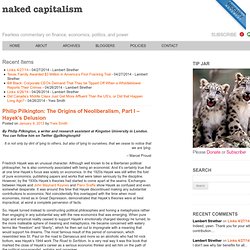
You can follow him on Twitter @pilkingtonphil It is not only by dint of lying to others, but also of lying to ourselves, that we cease to notice that we are lying. – Marcel Proust Friedrich Hayek was an unusual character. Although well known to be a libertarian political philosopher, he is also commonly associated with being an economist. So, Hayek turned instead to constructing political philosophies and honing a metaphysics rather than engaging in any substantial way with the new economics that was emerging. The over-arching argument of the book is well-known and need not be repeated too extensively here. The implicit argument here was that, Britain for example, which had begun to increasingly plan its economy during the war, was on a slippery slope that would end in totalitarianism. Philip Pilkington: The Origins of Neoliberalism, Part II – The Americanisation of Hayek’s Delusion.
By Philip Pilkington, a writer and research assistant at Kingston University in London.
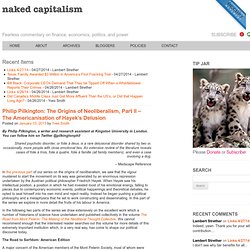
You can follow him on Twitter @pilkingtonphil Shared psychotic disorder, or folie à deux, is a rare delusional disorder shared by two or, occasionally, more people with close emotional ties. Why I agree with (some of) Friedrich Hayek. April 28, 2011 Friedrich Hayek is generally regarded as the apostle of a brand of economics which holds that the market will assure the optimal allocation of resources — as long as the government doesn’t interfere.
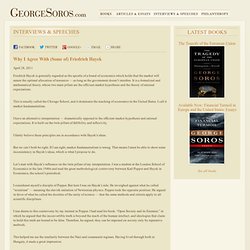
It is a formalized and mathematical theory, whose two main pillars are the efficient market hypothesis and the theory of rational expectations. This is usually called the Chicago School, and it dominates the teaching of economics in the United States. I call it market fundamentalism. I have an alternative interpretation — diametrically opposed to the efficient market hypothesis and rational expectations. I firmly believe these principles are in accordance with Hayek’s ideas. But we can’t both be right. The Road to Serfdom: Good Hayek or Bad Hayek? A new book by Angus Burgin about the role of F.
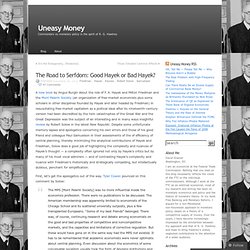
A. Hayek and Milton Friedman and the Mont Pelerin Society (an organization of free-market economists plus some scholars in other disciplines founded by Hayek and later headed by Friedman) in resuscitating free-market capitalism as a political ideal after its nineteenth-century version had been discredited by the twin catastrophes of the Great War and the Great Depression was the subject of an interesting and in many ways insightful review by Robert Solow in the latest New Republic.
First, let’s get the apologetics out of the way. Tyler Cowen pounced on this comment by Solow: The MPS [Mont Pelerin Society] was no more influential inside the economics profession. And one of Tyler’s commenters unearthed this gem from Samuelson’s legendary textbook: The Soviet economy is proof that, contrary to what many skeptics had earlier believed, a socialist command economy can function and even thrive.
But not exactly right. Maurice Allais, Paris H. F. F. Keynes Hayek, by Nicholas Wapshott. I just finished listening to Keynes Hayek: The Clash that Defined Modern Economics, by Nicholas Wapshott.
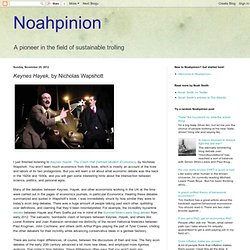
You won't learn much economics from this book, which is mostly an account of the lives and labors of its two protagonists. But you will learn a lot about what economic debate was like back in the 1920s and 1930s, and you will gain some interesting hints about the intersection between science, politics, and personal egos. Many of the debates between Keynes, Hayek, and other economists working in the UK at the time were carried out in the pages of economics journals, in particular Economica. Hearing these debates summarized and quoted in Wapshott's book, I was immediately struck by how similar they were to today's econ blog debates. There was a huge amount of people talking past each other, quibbling over definitions, and claiming that they'd been misinterpreted.
Hayek, Friedman, And The Illusions Of Conservative Economics. The Great Persuasion: Reinventing Free Markets since the DepressionBy Angus Burgin (Harvard University Press, 303 pp., $29.95) JUST AS I WAS wondering how to start this review, along came the Sunday New York Times Magazinewith a short article by Adam Davidson with the title “Made in Austria: Will Friedrich von Hayek be the Tea Party’s Karl Marx?”

One Tea Party activist reported that his group’s goal is to fill Congress with Hayekians. This project is unlikely to go smoothly if the price of admission includes an extensive reading of Hayek’s writings. As Davidson remarks, some of Hayek’s ideas would not go down well at all with the American far right: among them is a willingness to entertain a national health care program, and even a state-provided basic income for the poor. The source of confusion here is that there was a Good Hayek and a Bad Hayek.
But the Good Hayek also knew that unrestricted laissez-faire is unworkable. Masters of the Universe: Hayek, Friedman, and the Birth of Neoliberal Politics - 01 - 2013. Department of Economics public discussion Date: Wednesday 16 January 2013 Time: 6.30-8pm Venue: Old Theatre, Old Building Speaker: Dr Daniel Stedman Jones Respondents: Professor Mark Pennington, Professor Lord Skidelsky Chair: Professor Stuart Corbridge How did American and British policymakers become so enamoured with free markets, deregulation, and limited government?
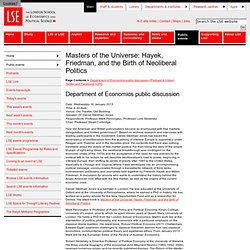
Based on archival research and interviews with leading participants in the movement, Daniel Stedman Jones has traced the ascendancy of neoliberalism from the academy of interwar Europe to supremacy under Reagan and Thatcher and in the decades since. He contends that there was nothing inevitable about the victory of free-market politics.